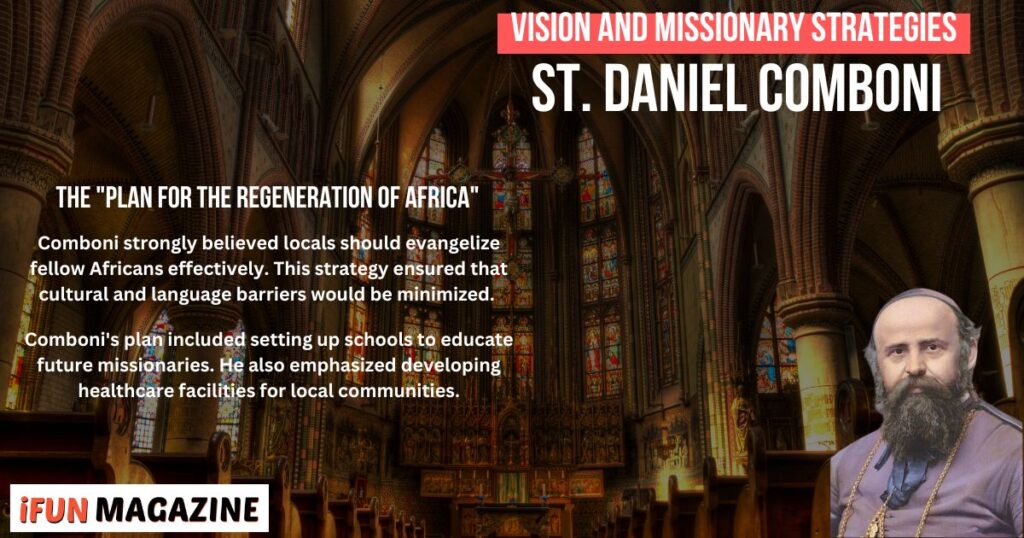St. Daniel Comboni was an Italian Roman Catholic missionary. He dedicated his life to serving in Africa, primarily Sudan. Born in 1831, he pioneered missionary work in Africa. Comboni founded the Comboni Missionaries of the Heart of Jesus. His work focused on evangelization and social development.
St. Daniel Comboni contributed significantly to missionary methods. He advocated for the local clergy and continuous mission education. His innovative ideas transformed missionary work. The Catholic Church acknowledges his contributions by commemorating him. In 2003, he was made a saint.
Comboni’s life, career, and enduring impact are investigated in this blog. His legacy in modern missions is profound and enduring.
Early Life and Education
On March 15, 1831, St. Daniel Comboni was born in Limone sul Garda, Italy. Luigi Comboni and Domenica Pace were his biological parents. His family was devoutly Catholic and instilled faith in him. From a young age, Comboni showed deep compassion for others. His childhood was marked by both hardship and strong familial support.
Comboni’s early education laid the foundation for his missionary zeal. He attended primary school in his hometown with immense enthusiasm for learning. His interest in missionary work emerged during his schooling years. Comboni was inspired by stories of missionaries working in distant lands. He felt a spiritual calling to serve and help others.
Comboni later pursued studies at the Mazza Institute in Verona. The institute provided Comboni with advanced theological and missionary education. At Mazza, he learned languages and cultural studies essential for missions. His studies prepared him for the challenges of missionary life. The education solidified Comboni’s determination to work in Africa.
Also Explore: Pastor Mike Winger Biography: Life and Ministry Journey
About St. Daniel Comboni
We know all about St. Daniel Comboni in the following table.
| Aspect | Details |
| Introduction | Overview of St. Daniel Comboni, his significance, and legacy in the Catholic Church. |
| Early Life | Born on 15 March 1831 in Limone sul Garda, Italy; raised in a devout Catholic family. |
| Education | Studied at the Mazza Institute in Verona, where his missionary calling was nurtured. |
| Missionary Vocation | Inspired to serve Africa, he was ordained as a priest in 1854 and took his initial journey to Sudan in 1857 |
| Key Challenges | Faced diseases, high mortality among missionaries, cultural barriers, and logistical hardships. |
| Vision and Strategy | Developed the “Plan for the Regeneration of Africa,” focusing on empowering Africans to evangelize their communities. |
| Founding of Societies | His mission was endorsed by the creation of the Comboni Missionaries in 1867 and the Comboni Missionary Sisters in 1872. |
| Social Contributions | Struggled for the abolition of slavery and supported self-sufficiency, healthcare, and education in African communities. |
| Major Achievements | Founded missions, schools, and seminaries; created a framework for long-term evangelization in Africa. |
| Death | Died in Khartoum, Sudan, on October 10, 1881, from weariness and health issues. |
| Canonization | Pope John Paul II designated her a saint in 1996, and on October 5, 2003, she was made a saint. |
| Feast Day | Celebrated annually on 10 October. |
| Legacy | Revered as a pioneer of modern missionary work; continues to inspire efforts in social justice and faith-based service. |
| Impact Today | The Comboni Missionaries actively work in education, healthcare, and evangelization across the world. |
Missionary Vocation
Calling to evangelize Africa
Daniel Comboni felt a strong calling to share his faith in Africa. His decision to become a missionary was inspired by his desire to serve others. Comboni thought that God was forcing him to go to Africa.
Ordination as a Priest (1854)
Daniel Comboni received the ordination as a Roman Catholic priest in 1854. His ordination marked the beginning of his dedicated mission to Africa.
First Missionary Journey to Sudan (1857)
Daniel Comboni launched his first tour to Sudan in 1857. This journey fulfilled his dream to serve the African continent.
Challenges Faced
Diseases: In Sudan, Comboni faced severe illnesses that were widespread and deadly. Health risks were a constant threat to Comboni and his fellow missionaries.
Cultural Barriers: Comboni encountered significant cultural differences that made communication challenging. His work required understanding and respecting the local customs.
Mortality: Due of the difficult living conditions, many missionaries experienced significant mortality rates. Comboni’s passion to his goal remained constant in the face of these challenges.
St. Daniel Comboni Vision and Missionary Strategies

The “Plan for the Regeneration of Africa”
Emphasis on Africans Evangelizing Africans
Comboni strongly believed locals should evangelize fellow Africans effectively. This strategy ensured that cultural and language barriers would be minimized. Comboni’s approach emphasized empowering locals to spread the Christian faith. By involving Africans, the mission’s sustainability was significantly enhanced.
Establishment of Educational and Healthcare Systems
Comboni’s plan included setting up schools to educate future missionaries. He also emphasized developing healthcare facilities for local communities. African societies depended heavily on education for social and economic advancement, while medical services aimed to enhance the general health of citizens.
Formation of Missionary Societies
Comboni Missionaries of the Heart of Jesus (Founded in 1867)
To help in his African missionary work, Comboni established the Comboni Missionaries. This society focused on spreading Christianity and aiding in social development.
Comboni Missionary Sisters (Founded in 1872)
By integrating women, the Comboni Missionary Sisters enhanced the missionary undertakings. They played vital roles in education and healthcare within African communities.
Death and Legacy
Death on 10 October 1881 in Khartoum, Sudan
During an illness, Daniel Comboni died in Khartoum on October 10, 1881. His departure caused the missionary community endure a great loss. Despite his passing, his dedication left a lasting impact on Africa. Comboni’s commitment to his mission inspired many to continue his work. He died knowing his efforts had begun a transformative movement in Africa.
Influence on Missionary Work in Africa
Comboni’s strategies influenced many who came after him in missionary work. His approach to empowering locals reshaped traditional missionary methods in Africa. Many missions adopted his values of education and healthcare alongside evangelization. Comboni’s life demonstrated the importance of cultural respect and understanding. His work laid the groundwork for collaboration with African communities. The sustainable missions he began continue to flourish after his passing. Comboni’s ideas inspired future generations of missionaries to be more inclusive.
FAQs
What is the contribution of Daniel Comboni?
Daniel Comboni contributed by promoting local empowerment and education in African missionary work. His influential strategies focused on improving healthcare and abolishing slavery across the continent. Comboni founded missionary societies to spread Christianity, emphasizing cultural respect and collaboration.
When did Daniel Comboni come to Sudan?
Daniel Comboni first arrived in Sudan to begin his mission work in 1857.
What is Saint Daniel Comboni the patron saint of?
Saint Daniel Comboni is the patron saint of missionaries working with African communities, promoting peace and unity.
What is St. Daniel famous for?
St. Daniel is famous for advocating educational and healthcare improvements in African missions.
Conclusion
The life and legacy of St. Daniel Comboni offer timeless inspiration. His commitment to empowering Africans remains a model for change worldwide. Comboni’s efforts in education transformed many lives in African communities. His innovative missionary strategies still influence modern practices globally. Comboni’s dedication to abolishing slavery set a foundation for human rights advancement. His acceptance of cultural diversity improved mission effectiveness across Africa. Comboni’s visionary leadership serves as a guide for future missionaries today. His work emphasized the importance of health and education in missionary efforts. St. Daniel Comboni’s story inspires through compassion, courage, and unwavering faith. His profound impact continues, driven by those who share his vision. His enduring influence persists, bridging past achievements with future possibilities in ministry.




